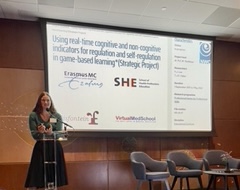Research: Identifying indicators to guide adaptive scaffolding in games
NWO-funded research into game-based learning, using abcdeSIM, by Erasmus MC and Maastricht University, in collaboration with IJsfontein and VirtualMedSchool: “Identifying indicators to guide adaptive scaffolding in games.” Research by: Tjitske J.E. Faber, Mary E.W. Dankbaar, Rob Kickert, Walter W. van den Broek en Jeroen J.G. van Merriënboer.
Highlights:
• Adaptive scaffolding may enhance learning in game-based learning environments.
• Potential indicators for scaffolding include a range of online and offline measures.
• Systematicity and thoroughness are valid indicators for first-order scaffolding.
• Monitoring traces and global SRL are valid indicators for second-order scaffolding.
Abstract
In game-based learning, adaptive scaffolding can enhance the learning of domain-specific skills, known as first-order scaffolding, and self-regulatory skills, known as second-order scaffolding. To design adaptive scaffolding, we need indicators that identify learning opportunities. Therefore we investigated how indicators of performance and self-regulation relate to overall game performance in a medical emergency simulation game. These indicators have the potential to guide the design of adaptive first-order and second-order scaffolding, respectively. Twenty-six fourth-year medical students played 116 game sessions. Using a multilevel model, we investigated the relationship between overall game performance and a range of online and offline measures. For first-order scaffolding, accuracy, systematicity and thoroughness were found to be valid indicators; for second-order scaffolding, high global self-regulatory scores and frequent monitoring were found to be valid indicators. These indicators can be included in future algorithms for adaptive scaffolding in game-based learning.
You can read and download the complete article here.

